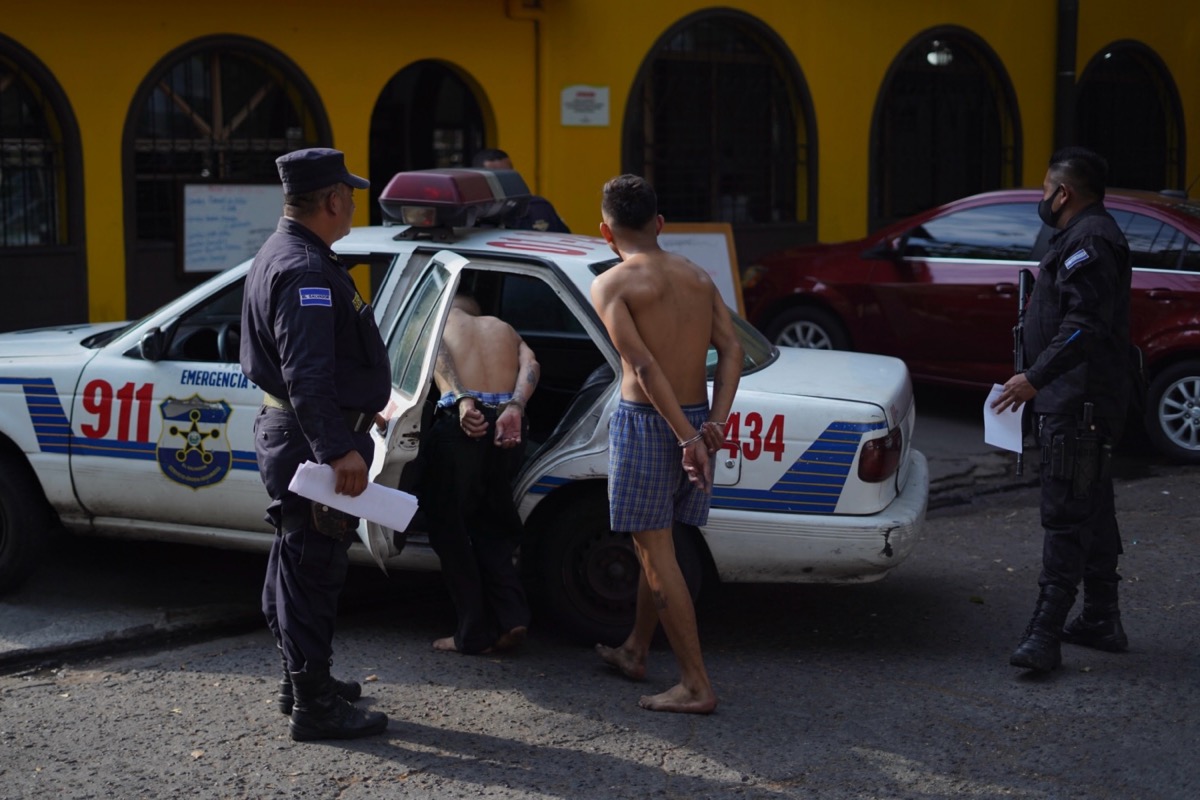

Officials claim to have made just under 27,000 arrests during the state of exception, making for an average of over 600 per day. (Carlos Barrera/El Faro)
El Salvador, in Brief: Despite unprecedented peacetime policing operations that led to 27,000 arrests in two months, gangs continue to extort businesses as an expression of their territorial control. Human rights groups and the press have also documented at least five in-custody deaths during President Nayib Bukele’s state of exception. Destitute women from around the country scramble to locate detained relatives at the gates of overcrowded prisons.
“The Gangs Regrouped”
In just six weeks, the Salvadoran government claims to have jailed almost 27,000 people in police actions that seem to outdo in both volume and velocity the “Plan Mano Dura” of former President Francisco Flores and the “Plan Super Mano Dura” of his successor, Tony Saca. Thus far the offensive has resulted in overloaded prisons and courts and sent a shockwave of apparent human rights violations, uncertainty, and financial strain through the country’s lowest-income communities.
Perhaps the most chilling data point is that human rights monitors and the press have documented the cases of at least five individuals who died in custody, one of them with signs of possible torture.
The administration says as many as 11 people have died “in lethal encounters” with security forces during the state of exception, but minimizes the importance of their deaths and international condemnations. “Having just 11 deaths out of 26,755 arrests speaks highly of the professionalism of our security forces, of their respect for human rights,” Security Minister Gustavo Villatoro alleged in a Monday morning TV interview.
It’s unclear what long-term effect this strategy will have on the gangs. National homicide numbers have remained low for over five weeks now, but if there is one thing that appears not to have changed during Bukele’s state of exception enacted on March 26, it’s extortion. The payments, a backbone of the gangs’ brutal criminal enterprises touching 70 percent of the country’s businesses, can reach hundreds of dollars per month in a country where the same portion of the population works in the informal economy and most make under $500.
“At the start of the state of exception, extortion payments were suspended,” Federico Hernández, former head of the Chamber of Commerce, told El Faro’s Efren Lemus. “The gangs regrouped, waited a bit, and then resumed charging rent [extortion] like before.”
Lemus confirmed Hernández’s account with a restaurant owner, two members of a public transportation union, an agricultural wholesaler, a pharmaceutical company executive, and two street vendors. “In recent days, police patrols have come by my business, but the problem hasn’t gone away. I keep paying,” said the San Salvador restaurateur.
Each of the seven spoke with El Faro on condition of anonymity, for fear of retaliation from the government and the gangs. “I don’t want to end up like Catalino Miranda,” explained an advisor to a public transport union, referring to a well-known chicken bus strongman and Bukele critic, imprisoned in mid-March after the administration accused him of illegally raising the price of bus fares. The government then confiscated multiple of his company’s heavily-transited bus lines and put them in the hands of the military.
Where Is My Son?
As the climate of fear among civil society groups thickens, human rights monitors have played a key role in documenting abuses during the state of exception.
Human Rights Watch (HRW) and Salvadoran counterpart Cristosal have documented “serious abuse” including arbitrary detentions, police raids without a judicial warrant, short-term enforced disappearances, and in-custody deaths including that of musician Elvis Josué Sánchez Rivera, 21, on April 19. His relatives say authorities have not conducted an autopsy. Leading international forensic experts reported “lesions” on his body that “may have occurred in custody and may be the result of torture or other ill-treatment.”
In his Monday interview, Minister Villatoro stated that judges have ordered pre-trial detention for 15,000 of the 26,755 people arrested during the state of exception, and that just 168 people have been released due to lack of evidence. It’s important to recall that last September Bukele purged one-third of all judges and prosecutors, and in recent weeks has promised consequences for any judges perceived to favor gang members.
The mass arrests have overwhelmed the prison system and public defenders already stretched well beyond capacity. In many cases, the state provides no information on the whereabouts of the tens of thousands of detainees.
Every day dozens of women crowd around the country’s prison facilities in search of any trace of their sons, grandchildren, partners, and fathers who may or may not have any relation to the gangs, report El Faro photojournalists Carlos Barrera and Víctor Peña in a searing photogallery.
“Some of the women waiting outside have gone weeks without knowing where their family members are being held,” they note. “They don’t even know whether they have come to the right place.”
Thanks for your time. Please pass along our work and consider funding independent journalism in Central America, in its most critical hour, at support.elfaro.net.



[…] Source link #FARO #ENGLISH #InCustody #Deaths #Mass #Arrests #Salvador […]